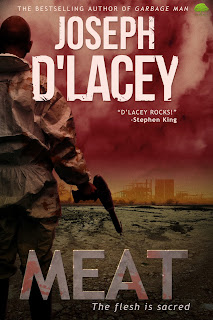Once again we're bringing some horror to the ruins, with another entry in our Halloween Read-tacular. Lock the doors, close the curtains, turn on all the lights . . . and enjoy.
 There are some books you devour, consuming page after page after page in a race to the end. Then there are others that you savor . . . that you take your time to digest . . . that linger on the literary palate long after the past page is turned.
There are some books you devour, consuming page after page after page in a race to the end. Then there are others that you savor . . . that you take your time to digest . . . that linger on the literary palate long after the past page is turned.
Joseph D'Lacey debut novel, Meat, is definitely the latter - and after being off the menu for years it's now back for a second helping.
With Black Feathers being my only experience with D'Lacey, I wasn't sure what to expect. I had a good idea of the concept, but really expected more of a Twilight Zone type novel with the true nature of the meat reserved for a big, final chapter reveal. Instead, the cannibalism is front and center right from the start, with the altered livestock as blatant as it is chilling.
Imagine a future dystopia where all that's left of the world is the people in it, and whatever they can grow. It's a world divided by class, with the people living under the corporate choke-hold of the Magnus Meat Processing, and guided by the religious tyranny of the Parsons of the Welfare. The most fortunate live in white-picket homes, enjoying their daily ration of meat, with just a touch of vegetables to provide a little color. The less fortunate have their vocal cords cut, their fingers and toes removed, and their freedom stripped away, leaving them - literally and figuratively - nothing more than cattle to be milked, bred, and butchered.
It's a really disturbing world that D'Lacey presents here, but one that gets worse the more you think about it. When I first put the book down, I came away appreciating it, but not enjoying is as much as I did Black Feathers. While the WTF nature of Meat was fascinating, and the central conflict an interesting one, I didn't find the characters nearly as engaging or sympathetic. Richard Shanti is an interesting lead, but too bland and cold to really rouse the reader's emotions. When I started thinking about it a few days later, though, with an eye towards writing a review, I realized just how deep, how profound, and how seriously messed up the story is.
It's the way D'Lacey contrasts the horror with the humanity that makes the story so effective. He takes us from scenes of human cattle being endlessly processed through a slaughterhouse, to scenes of cows and bulls enjoying a sliver of intimacy. He shows us a pair of young men cruelly torturing a human dairy cow with a high presssure hose, to a man tenderly worshiping the same dairy cow with a hose of his own. We watch a mother prostitute herself to a company man to get a little meat for her children, and then see those very same children slicing up a Barbie doll to serve, in pieces, to the toys at their tea party. Chilling stuff indeed.
Like a great steak, this is not a book that can really be described. Instead, it has to be experienced to be understood. If you have an appetite for something unique, a clever mind, and a strong stomach, then give it a shot. Meat shares many of the same themes as Black Feathers, including the social conscience, but it lacks the narrative subtlety. Be prepared to think about what you're reading, and to come away from it with a newfound appreciation for life . . . and death.
ebook, 351 pages
Published February 1st 2008 by Beautiful Books (first published 2008)
© 2013 Beauty in Ruins All Rights Reserved





